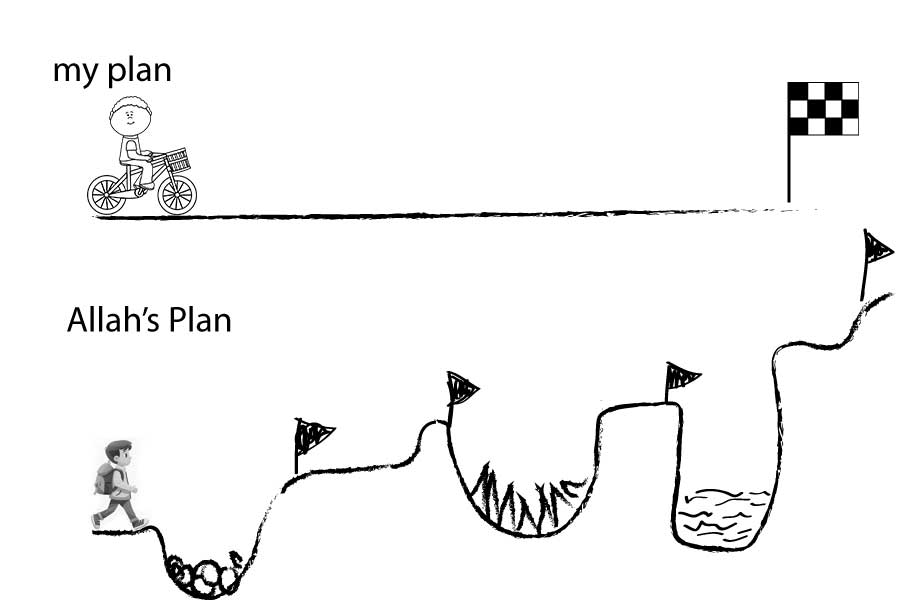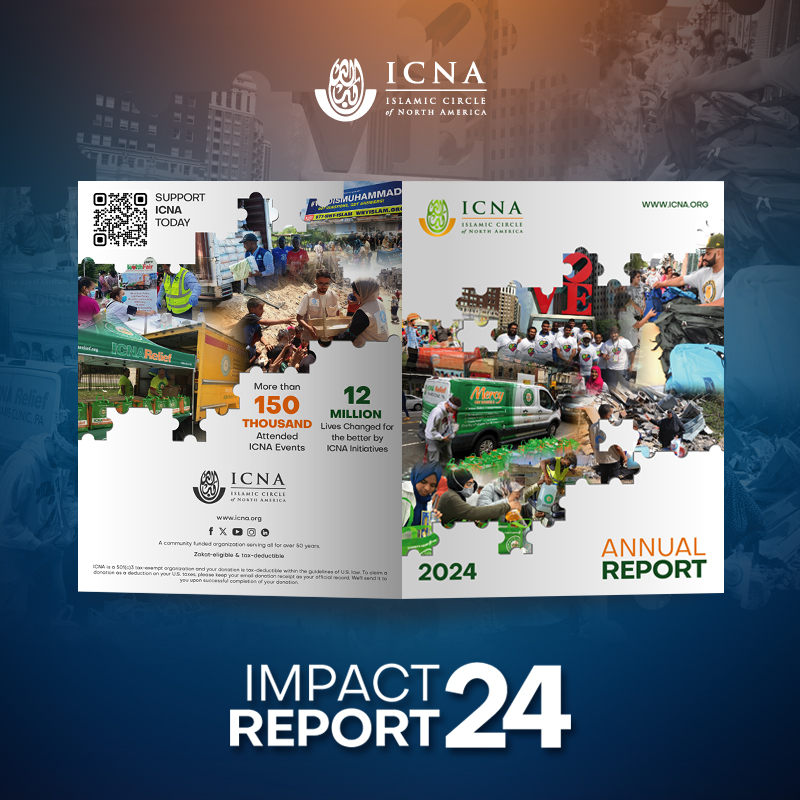
As Muslims, we believe that tawakkul, trust in and reliance on God, is one of the most important core principles and values in maintaining our spiritual identity and continued growth toward closeness to Allah. The concept of tawakkul is highly emphasized in the Qur’an and ahadith and by many great scholars. However, in this day and age, we have unfortunately come to oversimplify the meaning and understand it as a one-dimensional and depthless trust in God. But in reality tawakkul is a nuanced concept with far-reaching and profound implications. With everything going on in the world, it is important that we don’t lose sight of the foundation of relying on Allah and understanding that not everything is in our control.
Tawakkul: Qur’an and Ahadith
Allah says in the Quran, “And whoever has tawakkul, then Allah is all that he needs” (Qur’an 65:3). This verse illustrates how tawakkul is directly connected to reaching a state of contentment where we feel that God is all we need. Allah also tells us to “rely upon Allah, and sufficient is Allah as disposer of affairs” (Qur’an 33:3). The phrase “rely upon Allah” encourages believers to put their complete trust in Allah and rely on Him for guidance, help, and protection. It requires acknowledging that Allah is the ultimate source of strength and that He is fully capable of managing and taking care of all affairs. Truly tawakkul is one of the most important keys to living a life that is in accordance with the Qur’an and sunnah and gives us the security to thrive and flourish, to achieve our full potential.
This tawakkul in Allah gives us the strength to stay steadfast in our decisions as well. Allah says in the Qur’an, “So when you have decided, then rely upon Allah. Indeed, Allah loves those who rely” (Qur’an 3:159). We get the comfort of knowing our decisions have God’s support when we have tawakkul. Making decisions and taking action, interwoven with tawakkul, earns Allah’s love! What more could we want for ourselves? It gives the understanding that no matter what happens, that is what was meant for us because that is what Allah decreed. It gives us the motivation to continually renew our faith in qadr (divine destiny).
There is a beautiful hadith of the Prophet: “Strange are the ways of a believer for there is good in every affair of his, and this is not the case with anyone else except in the case of a believer. If he has an occasion to feel delighted, he thanks [Allah], thus there is a good for him in it; and if he gets into trouble and demonstrates sabr [patience and perseverance], there is a good for him in it” (Sahih Muslim). This hadith very clearly lays out how to construct our thoughts and attitudes around all types of events that befall us or surround us. If something good happens, we say “alhamdulillah,” and if something that we perceive as negative happens, we stay steadfast and patient and rely on Allah, knowing that this is what was written for us. The cultivation of these beliefs ensures that nothing can break our resolve and steadfastness in our belief in God and the meaning and purpose of our lives. How amazing to live a life in which encountering both favorable and unfavorable conditions and circumstances leaves us surrendered to, and content with, the decree of our Lord.
Prophet Muhammad (s) also said, “If you were to rely on Allah with the required reliance, then He would provide for you just as He provides for the birds. They go out in the morning empty and return full” (Sunan at-Tirmidhi). I may have nothing, come from nothing, and start the day with nothing, but with tawakkul, I know God will always provide what is needed.
Our Prophet (s) also said, “If you ask, ask from Allah, and if you seek help, seek help from Allah” (Sunan Abu Dawood). Why should we turn to anyone other than God? In Surah Ra’ad (13:28) Allah says “…those who believe and whose hearts find comfort in the remembrance of Allah, surely in the remembrance of Allah do hearts find comfort.” We can choose to remember Allah constantly, and in times of trial and tribulation, we can find comfort in dhikr, ultimately leading us back to tawakkul. We know that this is what was meant for us and this is the best for us. Ibn Abbas reported that the Prophet (s) said, “Seventy thousand from my nation will enter Paradise without reckoning. They are those who do not rely on incantations, nor believe in omens, but rather they trust in their Lord” (Sahih al-Bukhari). Not only will this trust help us in our earthly lives, it will more than suffice us if we can enter paradise without reckoning!
From this brief overview, we can conclude that tawakkul involves placing trust in and reliance on Allah in all aspects of our lives. It is intertwined with other Islamic values such as patience, gratitude, and acceptance of Allah’s decree. Tawakkul also teaches Muslims to have faith in Allah’s wisdom, providence, and guidance, knowing that He truly is the ultimate provider and controller of all affairs. Tawakkul requires active and sincere effort, aligning our beliefs and behaviors in such way that trust in Allah’s wisdom and decree imbues our lives with ultimate meaning, purpose, resolve, and sustenance.
From these ayahs and ahadith, we are encouraged to rely on Allah, seek His help through prayer and supplication, and trust that He will guide and support us. This belief then fosters inner peace, contentment, and a sense of surrender to the Divine Will.
Tawakkul: Scholarly Commentary
Ibn Taymiyyah
Sheikhul Islam Ibn Taymiyyah discusses in his various writings the concept of tawakkul, a fundamental aspect of faith, and how it positively affects the believer’s heart and actions; and he emphasizes the significance of tawakkul in one’s relationship with Allah and in getting closer to Allah. Ibn Taymiyyah highlights the need for Muslims to trust in Allah’s decree and have full confidence in His wisdom and plan. He emphasised that tawakkul involves recognising that all matters are ultimately in Allah’s hands and that relying on Him is the source of true tranquillity and peace, especially through hardship. He also makes the point that tawakkul must rest upon a foundation of adherence to the teachings of Islam and striving to please Allah.
Al-Ghazali
Imam al-Ghazali addressed the topic of tawakkul within the broader context of Islamic spirituality and ethics in “Ihya Ulum al-Din” (Revival of the Religious Sciences). He emphasised the importance of trusting in Allah’s plan and submitting to His will. He stresses that true tawakkul involves recognising that everything happens by the decree of Allah and that the believer accepts His wisdom, even in situations that may appear unfavourable or challenging. Al-Ghazali views tawakkul as an integral part of one’s spiritual development. He believed cultivating trust in Allah deepens one’s connection with the Divine and brings inner peace and contentment. Tawakkul allows individuals to detach themselves from excessive worry and anxiety, relying on Allah’s power and mercy.
Ibn Qayyim
Ibn Qayyim al-Jawziyya discussed the concept of tawakkul in “Madarij al-Salikin” by stating “Tawakkul is half of the religion, the other half is inaabah, turning to Allah.” He also emphasised that tawakkul involves placing one’s complete trust and reliance on Allah in all aspects of life and trusting in Allah’s wisdom, and accepting His decree, even if at times it may not align with our desires or expectations. He asserts that tawakkul involves submitting to Allah’s will and believing that whatever He decrees is ultimately for our best interests and that tawakkul should be accompanied by seeking Allah’s assistance through supplication (du’a), seeking His forgiveness, and engaging in acts of worship.
All three of these scholars maintained that there should be a balanced approach between human effort and reliance on Allah. While we should make sincere efforts and take practical steps, we should also understand that the outcomes are ultimately determined by Allah’s decree and we should find peace and contentment in that, expressing our tawakkul and faith in qadr, all the while still trying our best and making du’a. This action and expression of pure submission and reliance on Allah and an obedient lifestyle become the foundation upon which we can build character traits such as sabr (patience and perseverance), shukr (gratitude), and qana’ah (contentment with whatever Allah SWT bestows upon us). Striving in this way leads to emotional stability, mental resilience, and overall well-being. The ultimate result? — Allah SWT assures us of the fullest reward.
“And that there is not for man except that for which he strives. And that his effort is going to be seen – then he will be rewarded for it with the fullest reward” (Qur’an 53:39-41).





